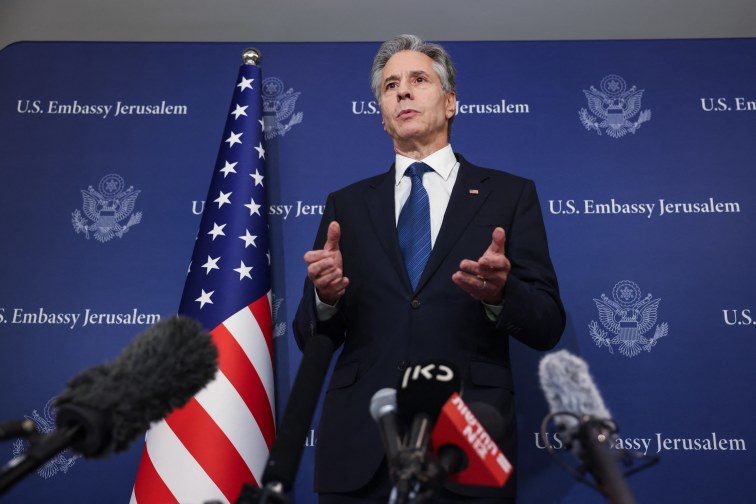Egypt called Tuesday for a cease-fire in the Israeli-Hamas war in Gaza, saying that the conflict could expand into a broader, regional war if fighting is not halted in the narrow territory along the Mediterranean Sea.
"The time has come to end the ongoing war, and to resort to wisdom, and to uphold the language of peace and diplomacy," Egyptian President Abdel-Fattah el-Sissi said in a statement after meeting at his summer palace in El Alamein with visiting U.S. Secretary of State Antony Blinken.
El-Sissi said all parties must be wary of the "danger of the conflict expanding regionally" and that the risk of broader warfare would be "difficult to imagine."
The Egyptian leader said a cease-fire in Gaza “must be the beginning of broader international recognition of the Palestinian state and the implementation of the two-state solution, as this is the basic guarantor of stability in the region."
During months of stalemated talks on a cease-fire in the 10 1/2-month war, the United States has maintained its support for a two-state solution calling for creation of an independent Palestinian state alongside Israel, but Israeli Prime Minister Benjamin Netanyahu has continued to oppose such an outcome as untenable for Israel’s security.
Egypt, along with Qatar and the U.S., have pushed negotiations for a cease-fire agreement between Israel and Hamas but have been unable to complete a pact.
After meeting with Netanyahu and other Israeli officials in Tel Aviv, Blinken said late Monday that the Israeli leader had accepted an American “bridging proposal” on a Gaza cease-fire deal.
“It’s now incumbent on Hamas to do the same,” Blinken said, and then with the help of mediators Egypt, Qatar and the United States, to “come together and complete the process.” Blinken did not say whether concerns cited by the Hamas militant group had been addressed.
It was Blinken’s ninth trip to the Mideast since the Israeli-Hamas war erupted last October 7 with the militants’ shock attack on Israel that killed 1,200 people and led to the capture of 250 hostages. Israel’s retaliatory offensive against Hamas in Gaza has killed more than 40,000 Palestinians, most of them women and children, according to Hamas health officials, although the Israeli military says the death toll also includes thousands of Hamas fighters.
Meanwhile, the Israeli military announced the bodies of six hostages had been recovered from Gaza.
The U.S. put forward a bridging proposal during last week’s cease-fire talks in Doha. Negotiations are set to resume in Cairo this week. Blinken said even if Hamas accepts the deal, there are still “complex issues” requiring “hard decisions by the leaders.” He didn’t offer specifics.
“We’re never giving up,” said Blinken, when asked if time to take the deal could ultimately run out. He held a one-on-one meeting with Netanyahu for 2 1/2 hours.
Some analysts were skeptical.
"I think there's a lot of wishful thinking going on, and I think the wishful thinking is because the stakes are now so high, because there is a potential for this conflict to escalate beyond its borders," Mirette Mabrouk, a senior fellow at the Middle East Institute, told VOA on Monday.
An Israeli government spokesperson told reporters on Monday that Netanyahu “stands firmly by the principle” that the Israel Defense Forces will maintain a physical presence in the Philadelphi Corridor — the border between the Gaza Strip and Egypt — to prevent what they describe as the resupply of Hamas’ weapons.
Earlier, Hamas accused Netanyahu of undermining the mediators’ efforts. Sami Abu Zuhri, a member of Hamas' political bureau, dismissed claims that signs of progress after two days of talks in Doha were “an illusion.”
There is an increased urgency to reach a deal amid fears of broader regional escalation if Iran and its Lebanese proxy, Hezbollah, retaliate against Israel for the assassination of a top Hezbollah operative in Beirut and Hamas political leader Ismail Haniyeh in Tehran.
Israel has claimed responsibility for the Beirut attack but not the Tehran one, although it is widely presumed to have carried it out.
Bodies of Hostages Returned
The bodies of six hostages, including five who were previously announced dead, were retrieved from Khan Younis in southern Gaza.
The military said it carried out the operation with the Israeli internal security agency Shin Bet.
Among the bodies recovered was that of 79-year-old Abraham Munder, whose death was announced Tuesday by his kibbutz community.
Kibbutz Nir Oz called Munder’s death “murder,” saying he endured "physical and mental torture for months.”
The other hostages were: Yagev Buchshtab, 35, who was abducted with his wife, who was released after 50 days in captivity; Alexander Dancyg, 75; Yoram Metzger, 80, who was abducted with his wife, who was released after 53 days; Nadav Popplewell, 51, who was abducted with his mother, who was released after 49 days; and Chaim Peri, 80.
In a statement early Tuesday, the Hostages Family Forum said Israel “has a moral and ethical obligation to return all the murdered for dignified burial and to bring all living hostages home for rehabilitation.”
“The immediate return of the remaining 109 hostages can only be achieved through a negotiated deal,” the statement said. “The Israeli government, with the assistance of mediators, must do everything in its power to finalize the deal currently on the table."
Netanyahu offered condolences to the families and pledged that Israel “will continue to make every effort to return all of our hostages – the living and the deceased."
Some information came from The Associated Press, Agence France-Presse and Reuters.




News magazine bootstrap themes!
I like this themes, fast loading and look profesional
Thank you Carlos!
You're welcome!
Please support me with give positive rating!
Yes Sure!